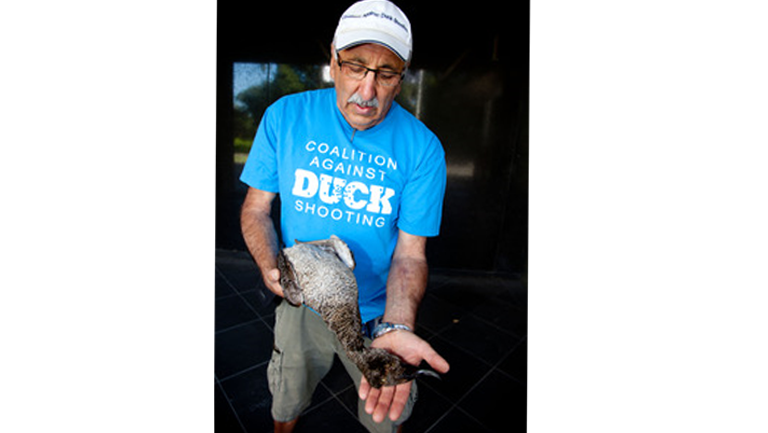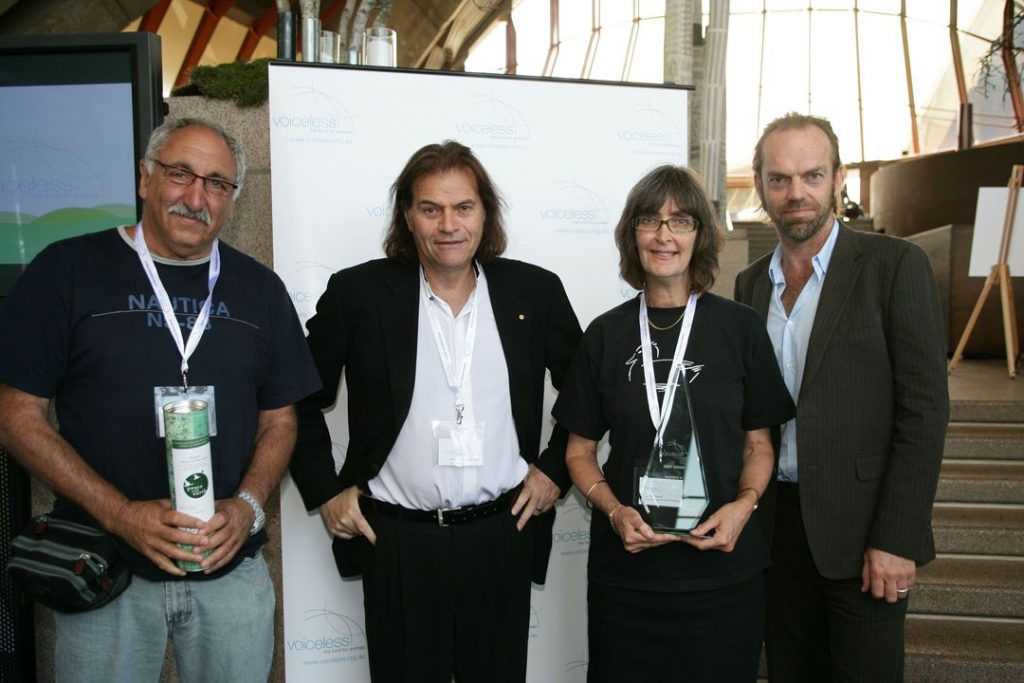Established in 1986, the Coalition Against Duck Shooting (CADS) has been campaigning for over thirty years to achieve a permanent ban on recreational shooting of native waterbirds in Australia. Although duck shooting is now banned in Western Australia, NSW and Queensland, four jurisdictions continue to allow the practice despite decreasing public support and evidence of regulatory non-compliance. Earlier this year, we spoke to CADS founder Laurie Levy in Melbourne about his long running campaign to protect Australia’s native waterbirds.
Meg Good: Can you tell us a bit about the story of how and why you created CADS?
Laurie Levy: In 1986, we took fifteen rescuers out to the wetlands to rescue wounded birds. There were 100,000 duck shooters in Victoria alone, at that particular point of time. And you might say: “How can fifteen people ever be effective against 100,000 duck shooters, and bring about change?”
We picked a wetland, and went down there, and of course all the media came out with us. And for the first time, native waterbirds that had been wounded were rescued. We also had a mobile veterinary clinic – nobody had ever thought, up until then, of a rescue team going out to help wounded birds, and to bring in illegally shot protected species, and threatened species.
So, the campaign was based on two images. One, of a duck shooter, dressed in camo gear carrying, in those days, a semi-automatic, or a pump-action shot gun; shooting down a small defenseless bird. The other image was of a rescuer coming out of the water with a wounded bird. And that second image, that one of kindness and compassion, will always win the hearts and minds of the public.
MG: And what was the aim of the campaign?
LL: Initially, we wanted duck shooting banned in Victoria. Along the way, after we started our campaign in 1986, we got so much media coverage – television, radio and newspapers – that people in other states wanted to start their own campaigns to fight for native waterbirds. Duck shooting was banned in Western Australia in 1990, and the Premier at the time said that the recreational shooting of native waterbirds was unacceptable in the 1990s. It was followed in 1995 by New South Wales, and then in Queensland in 2005. The Queensland Premier said in his media release that Queensland was now the ‘smart state’ for looking after its native waterbirds.

MG: Why do you think bans have been achieved in other jurisdictions, but not here in Victoria?
LL: We had more duck shooters in Victoria, 100,000 – where Western Australia probably only had 2,000. New South Wales had 12,000, and so on. Queensland only had about 800. So, we always had more wetlands, and more duck shooters.
MG: And would you say they’re a powerful lobby?
LL: Yes, they are. The shooters are powerful, but nowhere near the sort of power that you see in America with the National Rifle Association. Our strategy and tactics were always very simple. I mean, I’m an ex-television cameraman, so our campaign has always been a media campaign. And it’s a media campaign where we go into the wetlands, try and stop birds from flying into the guns by using whistles and flags, and we have a great rescue team. We’ve always had a wonderful rescue team. Built up of people with different skills, and different talents.
MG: Have you engaged in any direct lobbying of parliamentarians?
LL: Oh yes, but we really haven’t had a great deal of success in lobbying politicians. Our success really has come through changing public awareness. The more media coverage you get, the more public awareness changes. Over the last 33 years in Victoria, both the Liberal and Labor parties, the two main parties, have always had the same policy on duck shooting. Their policies support duck shooting. We knew it was going to be hard to change even the Labor party. So, the way we did it was by changing public opinion and reducing the numbers of duck shooters through attrition.
MG: Have you succeeded in changing any of the laws governing duck hunting?
LL: In the late 1980s, birds were dying from lead poisoning; from ingesting spent lead shot that was sitting on the bottom of the wetlands, and they would ingest it when feeding. We challenged this, and lead shot was finally banned in 2000. But it took quite a few years to get that. We also pushed for a compulsory waterfowl identification test for shooters.
MG: You’re referring to the test that requires a shooter to understand whether a species of duck is a protected species or not?
LL: Yes.
MG: If this practice is impacting on species that are supposed to be protected under the law, has that resulted in any kind of government action? Has there been an inquiry?
LL: The problem is the regulators are on the shooters side. And that’s why we have our investigative and enforcement team out there armed with cameras these days. Usually by giving the authorities our evidence, normally most of the stuff doesn’t get prosecuted. The only way we get prosecutions up really, is to give the media our videos. And once the media stories go to air, that’s when the regulators will act to charge those shooters.

MG: You were mentioning before that we had approximately 1,300 or so shooters active on the wetlands at this year’s opening in Victoria, which is a very small proportion of the Victorian population. Given that you’re at the forefront of understanding popular opinion on this, what would you say is the general sentiment amongst the Victorian populace? Have you done any surveying?
LL: In 2006, we received a grant from Voiceless to have a Roy Morgan Research survey conducted. That survey showed that 75 per cent of Victorians – city and regional people – wanted duck shooting banned. So we knew we had the public on side. The case from there on has just been to continually put pressure on duck shooters, and on the government.
As I said before, when we first started there were 100,000 duck shooters in Victoria. We used to go to Lake Buloke in 1989, and 1990, and there’d be 10,000 to 15,000 duck shooters on that one wetland, on the opening morning of the duck shooting season; all using, or probably 75 per cent of them using semi-automatic weapons.
It was frightening out there. Birds falling out of the sky everywhere. Our mobile veterinary clinics were overworked, and it was a tough time. But all that changed over the years, and it was the media. I can honestly say that the biggest weapon that we have had in reducing the numbers of duck shooters has been due to the media changing public awareness.
There are probably 26,000 or 25,000 duck shooters who are licensed to shoot ducks these days in Victoria, but they don’t go out anymore. Where you had 100,000 duck shooters in 1986, this year, according to the government, there were only 1,300 out there. And that’s public opinion bringing the number of duck shooters down.
And duck shooters often come up to me in the street, and they’ll say: “look, it wasn’t you that stopped me, it was my eight-year-old daughter”, or “my ten-year-old son”, or “my wife”, or “my partner”; and that’s how it works. Duck shooters realise that they’re seen as something that’s out of the history books, and they know that it’s not popular anymore, and that’s why they’re not out there.
MG: If we have all this popular opinion against duck shooting, and a very small number of duck shooters in Victoria, have any political parties tried to introduce a bill into the Victorian Parliament to ban duck shooting?
LL: Yes, the Greens did in 2008. But it didn’t succeed – we only got three votes in those days, because the Liberal and National parties voted to protect the shooters, and the Labor party voted to protect the shooters. The only way that we can win now— now that the Animal Justice Party have won a seat in the Upper House— is through Andy Meddick. He’s the best asset native waterbirds have had over the years in parliament. So, things are going to change. He’s got a terrific team working with him, and he’s working on a bill at the moment to have duck shooting banned.
Since this interview was conducted, Animal Justice Party MP Andy Meddick introduced the Wildlife Amendment (Protection of Birds) Bill 2019 into the Victorian Parliament, which seeks to ban duck hunting in the state. Read the Voiceless letter in support of the Bill here.
EXPRESS YOUR SUPPORT FOR A DUCK HUNTING BAN?
- Support the Coalition Against Duck Shooting
- Support the Animals Australia campaign against recreational duck shooting
- Write to relevant Victorian MPs to support the proposed Victorian ban:
The Hon. Daniel Andrews (Premier)
The Hon. Lily D’Ambrosio (Minister for Energy, Environment and Climate Change)
The Hon. Jaclyn Symes (Minister for Agriculture)

Voiceless Blog Terms and Conditions: The opinions expressed on the Voiceless Blog are those of the relevant contributors and may not necessarily represent the views of Voiceless. Reliance upon any content, opinion, representation or statement contained in the article is at the sole risk of the reader. Voiceless Blog articles are protected by copyright and no part should be reproduced in any form without the prior consent of Voiceless.


